2016 Democratic Presidential Primary
Confirmed 28,077
Part of a series on 2016 United States Presidential Election. [View Related Entries]
2016 Democratic Presidential Primary
Part of a series on 2016 United States Presidential Election. [View Related Entries]
[View Related Sub-entries]
Overview
The 2016 Democratic Presidential Primary is the preliminary round in the Democratic party’s candidate selection process for the 2016 general election for the presidency of the United States. The series of state caucuses and primaries began in February 2016 and end the following June.
Background
After President Barack Obama was re-elected in 2012, many began speculating about who would run for the Democratic presidential nomination in 2016. Then Secretary of State Hillary Clinton was widely anticipated as a potential candidate, having been defeated by Obama during the 2008 Democratic presidential primary. In December 2012, Clinton was rated favorably in several polls, including a Siena College poll with 54 percent of respondents saying she should run for president.[1] Additionally, incumbent Vice President Joe Biden was expected to enter the 2016 race.
Notable Developments
Hillary Clinton's Announcement
On April 10th, 2015, the Republican National Committee released a 30-second video titled “Stop Hillary,” featuring a silhouette of Clinton walking up to a lectern while voices criticizing her past political controversies play in the background (shown below).
On April 11th, Saturday Night Live aired a sketch parodying how Clinton would declare her candidacy for president (shown below, left). On the following day, Clinton announced her bid for the Democratic Party nomination in the 2016 U.S. presidential election in an YouTube video titled “Getting Started,” in which she expresses her desire to be America’s “champion” (shown below, right).
Bernie Sanders' Announcement
In March 2014, Vermont Senator Bernie Sanders revealed he was considering running for President of the United States but felt it was too soon for an official announcement. On May 26th, 2015, Sanders formally announced his bid for the Democratic Party's nomination (shown below). Unlike other presidential candidates, Sanders did not pursue funding through a Super PAC, instead focusing on small individual donations.
On May 30th, 2015, Governor of Maryland Martin O'Malley formally declared his bid for presidency as a Democratic candidate in the 2016 presidential election. On June 3rd, Rhode Island Governor Lincoln Chafee officially announced his candidacy for the Democratic presidential nomination. On June 15th, Virginia Senator Jim Webb declared he would be seeking the Democratic Party's nomination. On September 6th, Harvard Law School professor and political activist announced his bid for Democratic nomination after securing $1 million through crowdfunding.
Debates
CNN Debate: October 13th
On October 13th, 2015, the first debate for the Democratic presidential primary candidates will be held at the Wynn Hotel in Las Vegas, Nevada and aired on the CNN 24-hour cable news channel. The event will be moderated by CNN anchor Anderson Cooper with additional questions from anchors Dana Bash, Juan Carlos Lopez and Don Lemon. Clinton, Sanders, O'Malley, Webb and Chafee are set to appear at the debate, with an additional spot reserved for Joe Biden if he were to declare candidacy.[2]
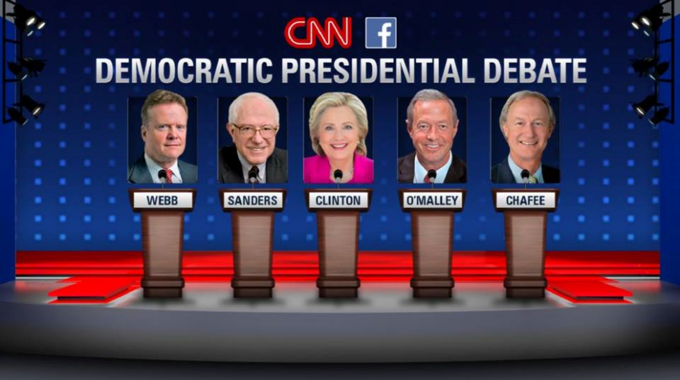
Primaries
The first caucus was held in Iowa on February 1st, 2016 and the last caucus was held in the District of Columbia on June 14th, with a total of six major candidates entering the race for a simple majority of 2,383 delegates to be nominated as the Democratic presidential nominee. From early on, the Democratic primaries and caucuses quickly took on the form of a rivalry between Clinton and Sanders. By Super Tuesday in early March, Clinton had secured 518 delegates to Sanders' 347 delegates after winning in 8 out of 12 states, stretching her lead by roughly 200 pledges delegates; throughout the first half of March, Clinton's campaign continued to gain momentum by winning in 8 out of 12 states and widened the margin of lead by more than 370 delegates. Between late March and mid-April, Sanders' campaign rebounded after winning in 8 out of 9 states, though Clinton ultimately continued to widen the gap between her and Sanders. On June 7th, Clinton's campaign declared victory after securing a majority of the pledged delegates and popular votes necessary for Democratic nomination.
Democratic National Committee Email Leak
On July 22nd, 2016, Wikileaks[9] published a collection of nearly 20,000 e-mails exchanged among key staff members within the Democratic National Committee (DNC), the governing body of the United States Democratic Party, as well as unofficial correspondences with members of the press, between January 2015 and May 2016. The leaked emails detail how several officials within the DNC, which is supposed to remain neutral during the primary electoral process, had attempted to sabotage Bernie Sanders' presidential campaign in order to secure Hillary Clinton's victory in the primaries. As a result of the leak, Debbie Wasserman Schultz, the chairwoman of the DNC, announced her resignation from the position. As of July 25th, the source of the leak remains unknown and the Democratic party has yet to issue an official response regarding the scandal.
Democratic National Convention
Anti-Clinton Protests
On July 25th, the Democratic National Convention began at the Wells Fargo Center in Philadelphia, Pennsylvania, exactly a week after the commencement of the Republican National Convention. Coming on the heels of a political scandal that unraveled from a massive email leak over the weekend, the opening day of the convention was marred by the visible absence of Debbie Wasserman Schultz, the now former chairwoman of the DNC who had resigned in the wake of the controversy, and vocal protests against Hillary Clinton from the angry supporters of Bernie Sanders, some of whom went as far as to chant "Lock Her Up," "Hillary for Prison" and other anti-Clinton slogans heard at the Republican National Convention.
Speeches
The highlights of the night included a keynote address from Senator Elizabeth Warren, a liberal icon within the Democratic Party, as well as passionate speeches from Michelle Obama and Bernie Sanders who urged the voters to unify the party by standing behind Hillary Clinton.
In addition, Senator Al Franken and Sarah Silverman made an appearance on stage to please the crowd, though their speech was interrupted by boos and jeers from the supporters of Bernie Sanders in the audience, prompting Silverman, an earlly supporter of Bernie Sanders, to call them out as "being ridiculous."
Crying Bernie Sanders Supporters
The tension on the opening day of the DNC was also reflected by the sheer volume of photographs of dismayed supporters of Bernie Sanders reacting in tears as Bernie Sanders delivered his firm endorsement of Hillary Clinton at the convention. By the next morning, the photographs of crying Bernie Sanders supporters had been declared a meme and "the viral star" of the first night of the Democratic National Convention by several news outlets.
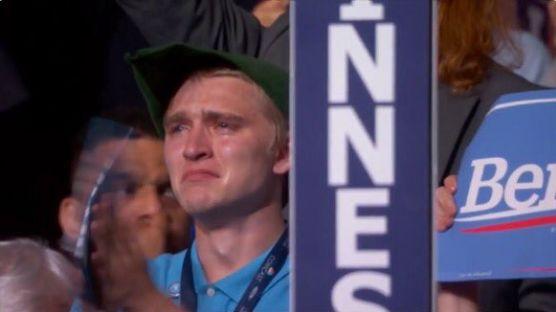

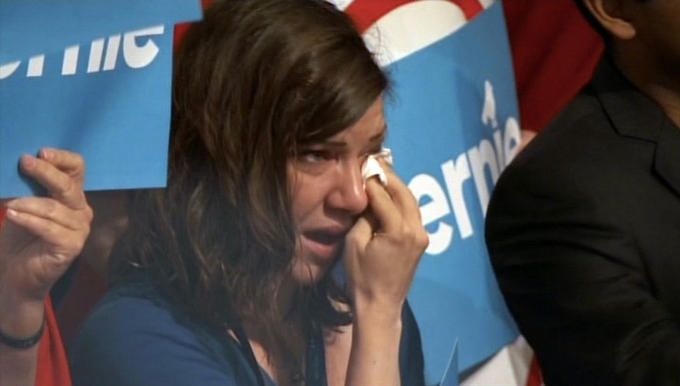
Susan Sarandon's Reaction
Meanwhile on social media, political news reporter Ian McKenna tweeted a GIF of American actress Susan Sarandon grimacing and shaking her head in distress in the audience with the caption "Susan Sarandon is having literally the worst time at the #DemConvention," which quickly went viral on Twitter and made the rounds in online news coverage of the Democratic National Convention. Within the hour, the famed actress who has been a longtime supporter of Sanders, responded to McKenna's commentary with the statement "accurate" via her Twitter account. In less than 24 hours, McKenna's tweet garnered more than 9,300 retweets and 16,000 likes, as well as an acknowledgement from Sarandon who responded by stating "accurate" via her Twitter account.
Related Memes
For more detailed summaries of internet memes and viral events relating to the individual candidates, please refer to the meme index pages of Hillary Clinton and Bernie Sanders.
#ToneDownForWhat
On March 28th, Hillary Clinton's chief strategist Joel Benenson criticized Sanders' "tone" and for "running a negative campaign" against Clinton when asked if they would participate in a debate prior to the New York primary on April 19th.
Shortly after, Sanders supporters began posting the hashtag #ToneDownForWhat, a reference to the trap song "Turn Down for What", on social media platforms like Facebook[4] and Twitter,[3] with many criticizing the Clinton campaign and calling for another debate between the candidates. In the coming days, several news sites published articles about the hashtag, including MSNBC,[5] Time,[6] CNN[7] and UpRoxx.[8]



Bernie or Hillary?
Bernie or Hillary? refers to a series of fake campaign posters in which Sanders is depicted as being more knowledgeable than Clinton on a series of popular but apolitical topics.
![Robot Uprising Bernie or Hillarv? Be informed. Compare them on the issues that matter. Isue Robot Uprising lyelling at Roomba] "BRING IT ONN A------!!" nervous metallic laugh HA HA HA obvious plant](https://i.kym-cdn.com/photos/images/newsfeed/001/074/762/06e.png)
Search Interest
External References
[1] Christian Science Monitor – New polls fuel speculation about Hillary Clinton in 2016
[2] Wikipedia – Democratic Party presidential debates
[3] Twitter – #tonedownforwhat
[4] Facebook – #tonedownforwhat
[5] MSNBC – Clinton campaigns hesitance to debate
[6] Time – Bernie Sanders Supporters Take Aim at Hillary With #ToneDownForWhat
[7] CNN – Hillary Clinton camp
[8] Uproxx – Bernie Sanders Fans Ask #ToneDownForWhat
[9] WikiLeaks – Search the DNC email database
[10] ABC News – The 4 Most Damaging Emails From the DNC WikiLeaks Dump
[11] New York Times – Democrats Struggle for Unity on First Day of Convention
Recent Videos 22 total
Recent Images 45 total
Share Pin
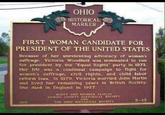

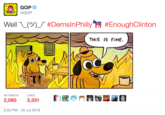
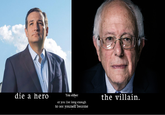











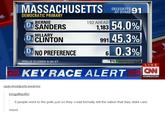


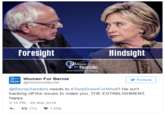

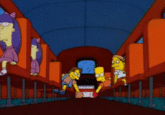

Comments ( 148 )
Sorry, but you must activate your account to post a comment.
Please check your email for your activation code.